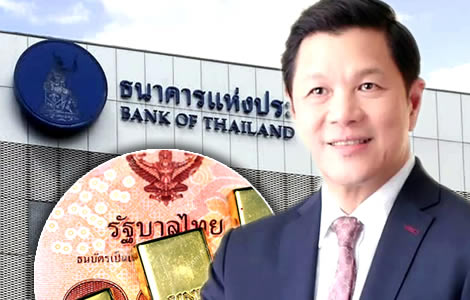Thailand’s new Bank of Thailand governor Vitai Ratanakorn pours cold water on talk of a sovereign wealth fund, stressing $267 billion in robust external reserves remain vital to supporting the baht, safeguarding financial stability and underpinning trade growth.
Thailand’s new central bank governor poured cold water over weekend talk of a sovereign wealth fund. Vitai Ratanakorn warned that such a move could impact financial stability if its aims and management were not carefully considered. He stressed that Thailand’s robust external reserves remain vital to supporting the baht and safeguarding an economy deeply dependent on world trade. The mooted proposal is closely tied to the country’s currency reserves, valued at $267 billion.

Thailand’s new Bank of Thailand Governor, Vitai Ratanakorn, this weekend dismissed the idea of creating a sovereign wealth fund. He emphasised that such a fund would not stabilise the baht or improve financial stability. Moreover, he stressed that Thailand’s current external reserves already provide sufficient tools to protect the national currency.
Governor Vitai explained that using international reserves to establish a sovereign wealth fund is unnecessary at this time. Indeed, the reserves primarily back banknotes circulating in the economy.
Consequently, they serve as a key mechanism to maintain the baht’s stability and the overall financial system. “We currently have no plan to establish a sovereign wealth fund, nor will we have one in the future,” he said. “It is not a tool to address exchange rate issues.”
Thai foreign reserves remain high and carefully managed to stabilise the baht and financial system
Thailand’s foreign reserves remain among the highest in the region. In August, they totalled $267.35 billion, a figure that has steadily increased over recent years. Nevertheless, the reserves have fluctuated, reaching highs of $280 billion depending on market conditions.
Importantly, these reserves are held in gold and foreign currencies, including the US dollar, euro, yen, and yuan. Therefore, their careful management is critical for macroeconomic stability. Furthermore, Governor Vitai noted that creating a sovereign wealth fund would not directly influence the baht. This is because the reserves are mostly in foreign currencies, not in baht. However, if a fund were considered to pursue additional returns, authorities would need to evaluate its objectives, legal frameworks, and impact on national stability.
Thailand’s strong external reserves have historically helped the country weather external shocks. For instance, during economic stress and political uncertainty, the reserves acted as a buffer. Moreover, the combination of robust reserves and strong banking sector balance sheets continues to protect the economy from volatility. Indeed, financial analysts argue that these safeguards underpin investor confidence and support foreign capital inflows.
Reserves support exporters and investors while chronic structural issues continue to slow GDP growth
In addition, they support business exporters and importers conducting business abroad, with the reserves allowing flexibility for free trade. Despite this strength, questions persist regarding the baht’s high value. A strong currency can reduce export competitiveness. Nevertheless, Thailand’s disciplined fiscal policies and robust external finances continue to attract foreign funding. Consequently, investor confidence in Thailand remains strong, reinforcing the country’s financial stability.
At the same time, chronic structural problems in the economy have retarded GDP growth for decades. These include major demographic changes, high household debt and an underperforming education system. The kingdom’s limited English proficiency is also considered an economic disadvantage.
Thai GDP growth in the last decade has averaged 1.9%, against the ASEAN average of 4.9%.
Currently, the Bank of Thailand is closely monitoring factors that could affect the baht. For example, the central bank is assessing the impact of gold exports on currency appreciation in 2025. Additionally, it continues to adjust its foreign reserves portfolio to respond to global market fluctuations. By doing so, the Bank ensures it remains well-prepared for sudden shocks.
Governor Vitai emphasises macroeconomic stability and careful reserve management over wealth fund
Governor Vitai emphasised that maintaining macroeconomic stability and investor confidence is more important than establishing a new fund. “Creating a sovereign wealth fund is not a solution to baht devaluation,” he said. Instead, careful reserve management, prudent banking, and adherence to international standards remain the country’s primary tools.
Moreover, the Bank of Thailand diversifies its reserves across different currencies and asset types. Consequently, this reduces exposure to market shocks and strengthens the baht. International reserves serve as a cornerstone of Thailand’s financial system, assuring both domestic and foreign stakeholders of its resilience.
Economists highlight that Thailand’s reserve levels remain high compared with many regional peers. As a result, the central bank can respond effectively to sudden capital movements or exchange rate pressures. This resilience has been a crucial factor in Thailand’s ability to weather economic crises over the past decade.
In addition, while sovereign wealth funds are used globally to diversify government assets and pursue long-term returns, Thailand prioritises stability over yield. Its policy focuses on liquidity, safety, and protection from volatility rather than speculative investment. Nevertheless, any future consideration of a wealth fund would require a comprehensive evaluation of legal frameworks and macroeconomic impacts.
Central bank manages reserves. Unveils new plan to aid small borrowers and safeguard financial stability
Thailand’s external reserves are actively managed and constantly adjusted to align with market conditions. Consequently, they remain liquid, secure, and capable of mitigating currency risks. Governor Vitai reaffirmed that transparency and adherence to international best practices are essential to maintaining credibility in global markets.
Finally, the Bank of Thailand under Governor Vitai remains focused on proven tools rather than creating a new investment vehicle. Strong reserves, vigilant oversight, and disciplined, prudent banking practices continue to safeguard the baht.
Bank of Thailand Governor plans to help 3 million distressed small loan borrowers, rolling out in 2026
The new governor has set addressing Thailand’s structural problems as his priority for his term, in addition to maintaining the country’s financial stability. Last week, the Monetary Policy Committee held Thailand’s borrowing rate stable at 1.5%. It is the third-lowest level in the world. However, the margins given to Thai banks are larger than regional peers. At the same time, they contribute to a Financial Institutions Development Fund (FIDF).
Last week, Mr. Vitai unveiled a plan to use a partial diversion of these levies on banks to fund a new asset management or “bad bank” initiative. It aims to offer debt relief to up to 3 million small-time borrowers in the kingdom.
Join the Thai News forum, follow Thai Examiner on Facebook here
Receive all our stories as they come out on Telegram here
Follow Thai Examiner here
Further reading:
Dark days ahead for the economy despite a 1.8% GDP gain with ominous warning signs on employment
Concern for US tariff deal as new Thai government shows enthusiasm for stronger links with Beijing
Thailand’s once mighty tourism industry is failing but now faces further damage from overvalued baht


















